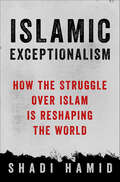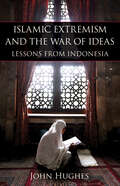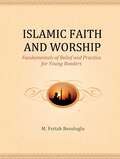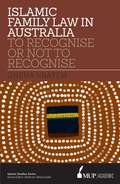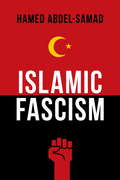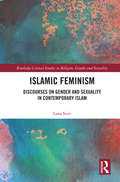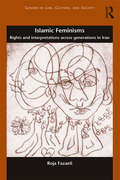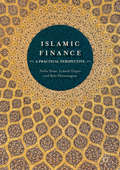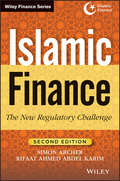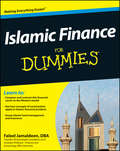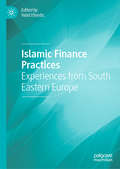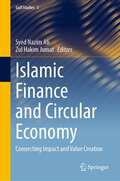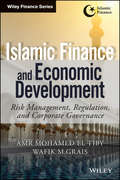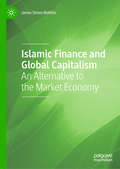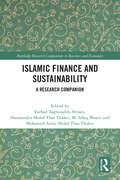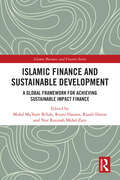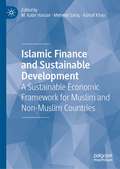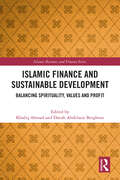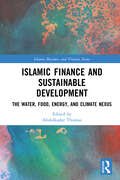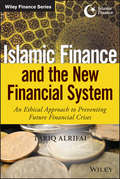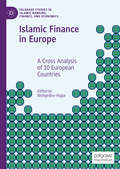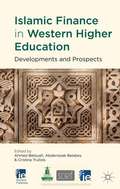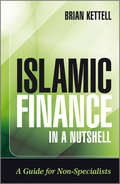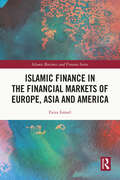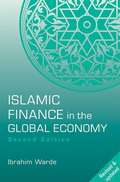- Table View
- List View
Islamic Exceptionalism: How the Struggle Over Islam Is Reshaping the World
by Shadi HamidIn Islamic Exceptionalism, Brookings Institution scholar and acclaimed author Shadi Hamid offers a novel and provocative argument on how Islam is, in fact, "exceptional" in how it relates to politics, with profound implications for how we understand the future of the Middle East. Divides among citizens aren't just about power but are products of fundamental disagreements over the very nature and purpose of the modern nation state—and the vexing problem of religion’s role in public life. Hamid argues for a new understanding of how Islam and Islamism shape politics by examining different models of reckoning with the problem of religion and state, including the terrifying—and alarmingly successful—example of ISIS. With unprecedented access to Islamist activists and leaders across the region, Hamid offers a panoramic and ambitious interpretation of the region's descent into violence. Islamic Exceptionalism is a vital contribution to our understanding of Islam's past and present, and its outsized role in modern politics. We don't have to like it, but we have to understand it—because Islam, as a religion and as an idea, will continue to be a force that shapes not just the region, but the West as well in the decades to come.
Islamic Extremism and the War of Ideas: Lessons from Indonesia
by John HughesJohn Hughes examines lessons learned from the practice of public diplomacy—especially international broadcasting—in the cold war and tells how the United States could more effectively counter extremism, promote democracy, and improve understanding of itself in the Islamic world. He offers Indonesia as a successful example of the melding of democracy, Islam, and modernity and suggests that this country and other nations where Islam and democracy coexist—such as Turkey—could play a significant role in helping thwart Islamist extremism.
Islamic Faith and Worship: Fundamentals of Belief and Practice for Young Readers
by M. Fettah ResulogluThe universe has been brought into existence as a peerless book speaking of its author, a masterpiece pointing to its Artist, a perfect poem indicating its Poet, and an unmatched treasure expressing the infinite wealth of its Owner. Every human being who can frame their perspective accordingly can observe the marks belonging to Allah everywhere they look, see His stamp and seal, and perceive the existence of Allah in their conscience. More precisely, the Lord of the Worlds makes Himself felt in the heart of a believer who strives to see Allah's Names everywhere they look and who exerts utmost endeavor to read in the Name of their Lord.This book is an essential guide to the basics of Islamic faith and practice for young Muslims, giving special importance to cleanliness and the Daily Prayers. With inspirational reading texts, this book can serve as a self-study manual, and is suitable as well for the curriculum of Islamic education.
Islamic Family Law in Australia: To Recognise Or Not To Recognise (Islamic Studies Series)
by Ghena KrayemIn recent years, all over the western world, a conversation has begun about the role of Islamic law or Shariah in secular liberal democratic states. Often this has focused on the area of family law, including matters of marriage and divorce. Islamic Family Law in Australia considers this often-controversial issue through the lens of multiculturalism and legal pluralism. Primarily, its main objective is to clarify the arguments that have been made recently. In both Australia and overseas, debates have occurred which have been both controversial and divisive, but have rarely been informed by any detailed analysis of how Muslim communities in these countries are actually dealing with family law issues. Islamic Family Law in Australia responds to this need for accurate information by presenting the findings of the first empirical study exploring how Australian Muslims resolve their family law matters. Through the words of religious and community leaders as well as ordinary Australian Muslims, the book questions the assumption that accommodating the needs of Australian Muslims requires the establishment of a separate and parallel legal system. Islamic Studies Series - Volume 16
Islamic Fascism
by Hamed Abdel-SamadThis polemic against Islamic extremism highlights the striking parallels between contemporary Islamism and the 20th-century fascism embodied by Hitler and Mussolini. Like those infamous ideologies, Islamism today touts imperialist dreams of world domination, belief in its inherent superiority, contempt for the rest of humanity, and often a murderous agenda. The author, born and raised in Egypt and now living in Germany, not only explains the historical connections between early 20th-century fascist movements in Europe and extremist factions in Islam, but he also traces the fascist tendencies in mainstream Islam that have existed throughout its history.Examining key individuals and episodes from centuries past, the book shows the influence of Islam's earliest exploits on current politics in the Islamic world. The author's incisive analysis exposes the fascist underpinnings of the Muslim Brotherhood, Hamas, Hezbollah, the Shia regime in Iran, ISIS, Salafi and Jihadist ideologies, and more. Forcefully argued and well-researched, this book grew out of a lecture on Islamic fascism that the author gave in Cairo, resulting in a call for his death by three prominent Egyptian clerics.From the Hardcover edition.
Islamic Feminism: Discourses on Gender and Sexuality in Contemporary Islam (Routledge Critical Studies in Religion, Gender and Sexuality)
by Lana SirriThis book sets out a rationale for the compatibility of Islam and Feminism and shows that Islamic Feminism is a diverse and valuable lens through which to analyse religion and gender. In addition, including scholarship written in Arabic, it promotes the decolonisation of knowledge production around Islam, gender and sexuality. Islamic feminism is a field of study that has been marginalised both in contemporary Islamic discourse and in feminist discourse. This study counters this marginalisation in two ways. Firstly, it enumerates the diversity of approaches used in Islamic feminist scholarship. Secondly, it foregrounds voices that are often neglected in discussions of Islam, gender and sexuality by highlighting and contrasting the work of two key scholars: Kecia Ali based in the USA and Olfa Youssef based in Tunisia. The book suggests that in addition to geo-political positioning, language, as a ‘prior-text’, also influences an individual’s personal interpretation of Islamic feminism. This comparison, therefore, enables broader issues to be dissected, such as the interrelationships between life experiences, strategies of resistance to patriarchal and other forms of oppression, and the production of knowledge. This is a unique study of Islamic Feminism that will be of great use to any scholar of Religion and Gender, Islamic Studies, Gender Studies and the Sociology of Religion.
Islamic Feminisms: Rights and Interpretations Across Generations in Iran (Gender in Law, Culture, and Society)
by Roja FazaeliThis book explores the contentious topic of women’s rights in Muslim-majority countries, with a specific focus on Iran and the Iranian women’s movement from 1906 to the present. The work contextualizes the authorial self through the use of personal narrative and interviews. A new critique of Islamic law is produced through an in-depth study of the Iranian Constitution, civil and criminal codes. The work presents a novel reconceptualization of the term "Islamic feminism" by revisiting the arguments of various scholars and through analysis of interviews with Iranian women’s rights activists. It is contended that the feminist movements can play a critical role in Islamic law reform and consequently the eventual implementation of international human rights law in Muslim-majority countries. What emerges from this study is not only a feminist critique of two major regimes of law, but also the identification of possibilities for reform in the future. The study transitions from the Iranian national context to the international by way of a comparative legal study of international human rights laws and Islamic laws. The book will appeal both to academics and human rights practitioners.
Islamic Finance
by Nafis Alam Lokesh Gupta Bala ShanmugamThis book provides a comprehensive and practical guide to Islamic finance. It covers a broad range of important topics including Islamic banking, capital markets, Takaful, wealth management, Fintech in Islamic finance, compliance and governance issues. It begins by introducing Islamic banking, covering its objectives, principles and evolution, before moving on to discuss the religious foundations of Islamic finance. The prohibition of Riba and Gharar and Islamic contracts are explored, before Islamic deposits, and financing are discussed in practice. A comparative analysis is provided between Islamic banking products and services in a range of counties throughout the world. Information technology including fintech, payment and settlement networks, opportunities and challenges are also addressed. Corporate governance, Islamic capital markets, and Islamic insurance (Takaful) are all explored, before concluding with a chapter on wealth management and Islamic investment funds. It features case studies based on the authors' own experiences consulting with Islamic financial institutions. Ideal for those looking to improve their understanding of practical Islamic financing models, contracts, product structures and product features, this book will appeal to both students and practitioners in Islamic finance and banking, those based in Islamic financial institutions, and those based in conventional financial institutions who may be looking to enter the Islamic financial market.
Islamic Finance
by Simon Archer Rifaat Ahmed Abdel KarimFrom the world's foremost authorities on the subject, the number-one guide to Islamic finance revised and updated for a post-crisis world Because it is entirely equity-based, rather than credit-based, Islamic finance is immune to the speculative bubbles and runaway volatility typical of Western finance. Especially now, in the wake of the global financial crisis, this has made them increasingly attractive to institutional investors, asset managers and hedge funds in search of more stable alternatives to conventional financial products. With interest in Islamic finance swiftly spreading beyond the Muslim world, the need among finance and investment professionals has never been greater for timely and authoritative information about the rules governing Islamic finance. This thoroughly updated and revised second edition of the premier guide to regulatory issues in Islamic finance satisfies that need. Addresses the need for banks to develop common Islamic-based international accounting and auditing standards Clearly explains the key differences between Shari'ah rulings, standardization of acceptable banking practices, and the development of standardized financial products Explores the role of the Shari'ah Boards in establishing common rules regarding the permissibility of financial instruments and markets Offers guidance for regulators seeking to adapt their regulatory frameworks to the needs of the fast-growing Islamic finance sector
Islamic Finance For Dummies
by Faleel JamaldeenA detailed look at the fast-growing field of Islamic banking and finance The global Islamic finance market is now worth about $700 billion worldwide. Islamic Finance For Dummies helps experienced investors and new entrants into Islamic finance quickly get up to speed on this growing financial sector. Here, you'll find clear and easy-to-understand information on how you can incorporate Islamic finance products into your investment portfolio. You'll quickly and easily: become acquainted with the theory, practice, and limitations of Islamic banking; understand how to develop products for the Islamic financial industry; grasp the objectives and sources of Islamic law and the basic guidelines for business contacts; learn about Islamic fund management and insurance; and much more. Coverage of the role Islamic finance can play in the development of the financial system and of economies Addresses the risks and rewards in Islamic banking The future prospects and opportunities of the Islamic finance industry With the help of Islamic Finance For Dummies, you'll discover the fast and easy way to tap into the booming Islamic finance arena.
Islamic Finance Practices: Experiences from South Eastern Europe
by Velid EfendicThis book discusses carefully selected topics in Islamic banking and finance (IBF) in South Eastern Europe (SEE) as one of the fastest growing areas in global finance. IBF originated within various Islamic banks, Islamic windows, investment funds, Takaful companies, and other financial institutions and has resulted in various global products. Although it is still in an early phase in SEE, IBF has developed rapidly in the last decade and has created a need for research on related topics, from the fundamental principles of IBF to the SCR, endowments and investment instruments to Islamic banking practices. This is our second book published as a result of the Sarajevo Islamic and Finance conferences (SIFEC). This conference traditionally gathers Islamic banking, economics, and finance academicians, experts, and students all over the world who discuss a wide range of topics in this field, focusing on the SEE. Consisting of seven chapters presenting original research, this book is a valuable resource for researchers as well as for practitioners and potential investors in IBF, especially in SEE.
Islamic Finance and Circular Economy: Connecting Impact and Value Creation (Gulf Studies #5)
by Syed Nazim Ali Zul Hakim JumatThis book is the first of its kind to provide a critical overview and theoretical analysis of the Circular Economy from Shariah and Islamic Finance perspectives. The book is divided into three parts. The contributing authors pay close attention to Islamic Finance in light of sustainability and value creation. It also includes case studies on the Circular Economy application in Islamic Finance industry. The book is of interest to academics, students, and practitioners on Islamic Economics and Finance who have an interest in understanding the Circular Economy under the lens of Islamic Finance principles and applications.
Islamic Finance and Economic Development
by Amr Mohamed El Tiby Ahmed Wafik GraisA comprehensive guide to mitigating risk and fostering growth in the Islamic financial sector<P><P> Islamic finance, like conventional finance is a business of financial intermediation. Its distinctive features relate to the requirement that it abides by Shari'a rules that promote fairness of contracts and prevention of exploitation, sharing of risks and rewards, prohibition of interests, and tangible economic purpose. Islamic finance should not fund activities considered “haram” or sinful. In Islamic Finance and Economic Development: Risk, Regulation, and Corporate Governance, authors Amr Mohamed El Tiby and Wafik M. Grais expound how these distinctive features bear on the opportunities and challenges facing the Islamic finance industry’s development, risk management, regulation and corporate governance.<P> An experienced banker with various Middle East banking institutions, notably as former Vice President at UAE Union National Bank and Mashreq bank, Dr. El Tiby offers an informed perspective on corporate finance from within the Islamic finance industry. With a long experience in international development and finance, notably as former Director at the World Bank and Founder and Chairman of a Cairo-based Financial Advisors company, Dr. Grais brings global financial experience on the topics of financial systems assessments, corporate governance, Islamic finance, and public policy.<P> * Covers the history and basics of Islamic finance, and provides insight into current conditions and future landscape<P> * Explores regulatory framework, including opportunities and challenges for the industry’s development and mainstreaming<P> * Presents an approach to developing a systemic Shari'a governance framework to govern operations in the Islamic finance industry
Islamic Finance and Global Capitalism: An Alternative to the Market Economy
by James Simon WatkinsThis book examines whether Islamic finance and Islamic economics is challenging the orthodoxy of the money markets. Can ethical finance combined with the prohibition on interest and speculation really work in the global economy? With a political economy approach, the book explores how the industry has grown in modern times – from a short-lived bank in an Egyptian city in the 1960s through to a global industry that is today valued at US$2.05 trillion. From the revelation as articulated by the Prophet Muhammed in the seventh century through to the gleaming 21st century skyscrapers of Dubai and Kuala Lumpur, the book covers the end of European colonialism, the controversial utterances of self-styled religious leaders, the impact of Islamophobia, and the efforts to end poverty through Islamic microfinance. The book uncovers an industry that is both profitable and changing the face of contemporary capitalism.
Islamic Finance and Sustainability: A Research Companion (Routledge Research Companions in Business and Economics)
by Taghizadeh-Hesary, Edited by FarhadThis book offers a comprehensive overview of Islamic finance and sustainability, showcasing how Islamic financial instruments can support environmentally sustainable initiatives.It delves into recent efforts to develop a Shariah-compliant financial and banking system that is sustainable, efficient, and stable. Contributors focus on Islamic financial products and tools, highlighting their potential to advance environmental sustainability. The discussions are organized around key themes, including the principles of sustainability in Islamic finance, risk assessment and mitigation, the Islamic stock market and sustainability, Green Fintech in Islamic banking and finance, and Green Sukuk in developing and emerging markets. The book addresses how Islamic finance can bridge the gap in green financing globally. Particular emphasis is placed on Green Sukuk, a Shariah-compliant bond created to fund environmentally sustainable projects, including those aimed at combating climate change and promoting ecological conservation.This comprehensive volume on Islamic finance and sustainability will be invaluable for policymakers, researchers, and academics interested in Islamic economics and finance, sustainable finance, and the green economy.
Islamic Finance and Sustainable Development: A Global Framework for Achieving Sustainable Impact Finance (Islamic Business and Finance Series)
by Mohd Ma’Sum Billah Rusni Hassan Razali Haron Nor Razinah Mohd ZainThe interest in improving Environmental, Social and Governance (ESG) outcomes among stakeholders of Islamic banking and finance has become front and centre in the discussions relating to Islamic sustainable finance.This book offers an expansive overview of the relevant issues, global initiatives and trends in the management, governance, and operation of Islamic sustainable impact finance. It identifies the models and mechanisms required to achieve sustainable impact finance in the context of Islamic investment and project development and collects and observes the latest approaches in maintaining and fulfilling the principles of Shariah-compliance in Sustainable Development Goals and Environmental, Social and Governance-oriented projects. The book also explores conventional financing instruments, which are being used in modern practice.While Islamic sustainable finance provides a positive change in the Islamic banking and finance industry globally, implementing it is not without its challenges. Such challenges, such as the fulfilment of Shariah-compliance requirements, both legally and jurisprudentially, and the application and development of modern innovative products and hybrid models of classical products are highlighted and addressed in the book. The book delves into the current management practices of Islamic banking and finance, which promote Islamic sustainable impact finance and outlines strategies for meeting sustainable investments and projects. Other factors, such as the latest technology, regulations and social, political and economic policies are also considered. Evidence is provided via case studies from selected countries that participate actively in the Islamic banking and finance industry globally.The book will attract a wide audience from researchers, scholars, and students to stakeholders of Islamic banking and finance, regulators, policy makers and Shariah-compliant practitioners.
Islamic Finance and Sustainable Development: A Sustainable Economic Framework for Muslim and Non-Muslim Countries
by Ashraf Khan M. Kabir Hassan Mehmet SaraçThe book is a collection of chapters discussing the Sustainable Development Goals in the broader context of Islamic finance along with mapping the SDGs with Maqasid Al-Shariah. It provides a framework for both Muslim and non-Muslim countries to develop a sustainable economy which encompasses not only the concept of the welfare state but also supports development-related activities, ensures financial inclusion through equal distribution of wealth and alleviation of poverty, and protects the overall environmental and ecological system. More specifically, this book explores various aspects of Islamic finance in relation to parameters of SDGs; restructuring of Islamic finance and connecting its dots in the light of SDGs; Islamic perspective on ESG and ecological quality; interest-free tools and modernization of Islamic financial institutions for sustainable development and economic stability; and the role of Islamic finance in infrastructure-related development activities. Consistent with the view that SDGs are embedded within the theme of Islamic finance, this book is specifically designed to meet the needs of key regulatory institutions, academic scholars, and industry practitioners both in the field of Islamic finance and sustainable finance.
Islamic Finance and Sustainable Development: Balancing Spirituality, Values and Profit (Islamic Business and Finance Series)
by Khaliq Ahmad Datuk Abdelaziz BerghoutThis book uncovers a new dimension in the study of sustainability, offering balanced development from a spiritual and cultural values perspective. The authors of this edited volume investigate the role of religion in the debate concerning the Sustainable Development Goals (SDGs) and offer an Islamic perspective to environment, social and governance (ESG) issues.Applying a multidimensional approach to socio-economic development, this book contends that Islam offers a unique perspective and framework for sustainable development that is holistic and rooted in spirituality, morality and ethics. For example, the book explains how Islam lays emphasis on human talents development (SDGs 3 and 4), which is a key element in accelerating socio-economic growth (SDG-8). It also offers a wide range of social financial tools such as Zakat and Waqf that can be used to address SDGs 1 (poverty), 2 (hunger), 5 (gender equality) and 10 (reducing inequality). Islamic finance offers a number of tools for long-term financing such as sukuk that can masterfully be used for building sustainable infrastructure (SDG-9). The study also reviews some Islamic principles from the Holy Qur'an that can positively SDGs.Students, scholars and researchers in the fields of Islamic economics and finance, sustainable development and socio-economic and environmental issues will find the book a valuable resource.
Islamic Finance and Sustainable Development: The Water, Food, Energy, and Climate Nexus (Islamic Business and Finance Series)
by Abdulkader ThomasThe proliferation of energy, agricultural, water and food insecurity can be attributed to a multitude of factors, including advancements in technology that have facilitated the technical and economic utilization of energy and water resources, environmental degradation, climate anomalies, mounting pressure on water resources due to escalating demand, and surging energy requirements. These challenges have been addressed from multiple perspectives, ranging from Islamic social finance to large scale project finance. Large corporations are also involved in tackling the environmental impact of climate change or operating in water stressed regions. This book argues, however, that there is little value to be gained from this activity when sustainability initiatives and frameworks are not being measured.The book surveys Islamic finance and sustainability theories, setting the stage to detail the actual work of businesses, banks, non-governmental organizations (NGOs), and multilateral agencies addressing water, food and energy insecurity. It examines case studies, which cover diverse aspects of sustainability, mostly, in the context of fragile economic and ecological situations, and discusses practical cases from an Islamic perspective, in which local and regional problems are addressed. An important feature of the book is the description of how Islamic social finance builds pathways to scale for the mobilization of funds as well as the expansion of sustainable ventures. Further, the unique issues of carbon markets are explored from the perspective of Shariah compliance as well as managing adverse events. The cases present replicable, scalable solutions. These unique stories align theory to reality and sometimes, they highlight the shortfalls in the theory.The cases allow researchers, academics and policy makers an opportunity to examine the effectiveness of theories and policies opposite real-life experiences and also give business and NGO leaders clear examples to follow.
Islamic Finance and the New Financial System
by Tariq AlrifaiCan Islamic finance save the global system? Islamic Finance and the New Financial System describes how the adoption of Islamic finance principles in future regulatory decisions could help prevent future shocks in the global financial system. Using illustrations and examples to highlight key points in recent history, this book discusses the causes of financial crises, why they are becoming more frequent and increasingly severe, and how the new financial system will incorporate elements of Islamic finance - whether deliberately or not. With an introspective look at the system and an examination of the misconceptions and deficiencies in theory vs. practice, readers will learn why Islamic finance has not been as influential as it should be on the larger global system. Solutions to these crises are thoroughly detailed, and the author puts forth a compelling argument about what can be expected in the future. Despite international intervention and global policy changes, the financial system remains in a fragile state. There is an argument to be made about integrating Islamic finance into the new system to facilitate stronger resilience, and this book explains the nuts and bolts of the idea while providing the reader with a general understanding of Islamic finance. Understand the key principles of Islamic finance Examine the history of the current financial system Discover how Islamic finance can help build a new debt-free economy Learn how Islamic finance theory doesn't always dictate practice Although Islamic finance is a growing market, it is still a foreign concept to many. Those within the Islamic finance circles wonder why the system has yet to gain broader appeal despite its ability to create a strong and well-balanced economy. Islamic Finance and the New Financial System provides clever analysis and historical background to put the issues into perspective.
Islamic Finance in Europe: A Cross Analysis of 10 European Countries (Palgrave Studies in Islamic Banking, Finance, and Economics)
by Mohyedine HajjarInformation about Islamic finance in European countries is usually provided by professional-style reports, offering practical data on implementation of standardized products. However, precise developments about material legal provisions applicable to contracts and their actual legal regime are not often detailed. In order to fill this gap, 15 researchers from across Europe contributed to this project. They describe the state of actual Islamic finance in 10 European countries, as well as applicable EU law. By combining legal analysis with statistical description of existing practices and social demand, this book provides an exhaustive account of the current potential of Islamic finance in Europe.
Islamic Finance in Western Higher Education
by Cristina Trullols Ahmed Belouafi Abderrazak BelabesThis is the first of its kind in its topical coverage of the developments and prospects of Islamic finance education at Western higher education. Intended to establish itself as a unique reference for academics and researchers this book gives an insight into ethics and values in curricula development at business schools and in finance departments.
Islamic Finance in a Nutshell
by Brian KettellThe recent turbulence in the global financial markets has drawn attention to an alternative system of financial intermediation: Islamic banking and finance, which has so far remained on the sidelines of the unrest.Islamic Finance in a Nutshell is a quick and easy guide to understanding the fundamentals of Islamic Finance and how the Islamic Financial markets work. Designed as a quick read for practitioners needing to pick up the basics of the industry, it will enable readers to understand the differences Islamic and Western finance.Starting with the rise of Islamic finance, the book highlights the key areas which practitioners need to grasp to understand the marketplace including financial statement analysis, Sharia'a law, making money in the absence of interest and regulation. The book also provides readers with a basic guide to Arab terminology and a guide to the top financial institutions within the Islamic markets.This is an ideal guide for anyone with an interest in how these financial markets work, but who do not want to be bogged down in complex and unnecessary terminology.
Islamic Finance in the Financial Markets of Europe, Asia and America (Islamic Business and Finance Series)
by Faiza IsmailAmong international financial centres (IFCs), London is known as the ‘Western hub of Islamic Finance’, on account of its well-developed legal infrastructure. However, Brexit has threatened London’s status and consequently, the financial services industry is moving to Dublin to continue operating in the Euro region. Similarly, Islamic finance (IF) service providers in the UK are also looking to Dublin for expansion of this niche area in euro member states. This is the first book to be written about Islamic finance operations in the Eurozone. The book offers an in-depth description of International Financial Centres and the growth of Islamic Finance, compares the growth of Islamic finance in London, Dubai and Kuala Lumpur, outlines the implications of Brexit for financial service providers in London in general and Islamic investors in particular and also presents a case study of Ireland to establish the latter as the most appropriate country to promote IF in the Eurozone. The time is particularly right for a book exploring the potential of Ireland to emerge as a Eurozone hub of Islamic finance, as a result of Britain’s exit from Europe. The book will cater to the needs of readers studying Islamic finance (IF) in the disciplines of economics, business, law, and religion. A secondary market includes practitioners, such as policymakers, lawyers, fund managers, accountants, regulators and international investors, who will be interested in exploring the benefits that the UK and Ireland have to offer the Islamic finance industry.
Islamic Finance in the Global Economy
by Ibrahim WardeIslamic finance is growing at an astonishing rate and is now a $1200 billion industry, with operations in over 100 countries. This book explains the paradox of a system rooted in the medieval era thriving in the global economy. <P><P>Coverage is exhaustively comprehensive, defining Islamic finance in its broadest sense to include banks, mutual funds, securities firms and insurance (or takaful) companies. The author places Islamic finance in the context of the global political and economic system and covers a wide variety of issues such as the underlying principles of Islamic finance, the range of Islamic financial products, and country differences. He also discusses a number of economic, political, regulatory and religious concerns and challenges. <P><P>This second edition has been completely revised and updated to take into account the great changes and developments in the field in recent times. It includes the impact of the 9/11 and 7/7 terrorist attacks on the industry, the new forms of interaction with Western financial institutions, the emergence of innovative products such as sukuk, attempts by a broad range of financial centres - including Kuala Lumpur, London, Singapore, Bahrain and Dubai - to become global hubs of Islamic finance, and the repercussions of the 2008 global financial meltdown on Islamic institutions.
